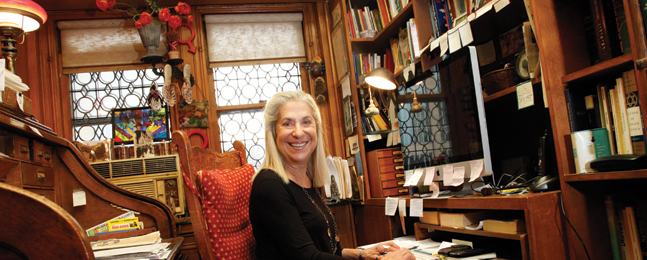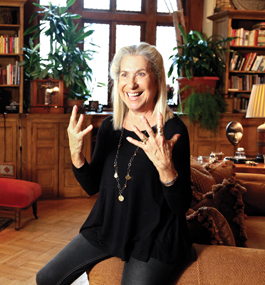The Brandeis Questionnaire
Letty Cottin Pogrebin ’59

Photo by Mike Lovett
When it was launched in 1971, Ms. magazine heralded a new world for women — and men. It catapulted below-the-radar topics like domestic violence, sexual harassment, the right to abortion and workplace discrimination into the national conversation, and quickly became an avatar of modern feminism.
As founding editor Letty Cottin Pogrebin ’59 has said, “Ms. translated a movement into a magazine.”
Less than a dozen years after Pogrebin graduated from Brandeis, her work at Ms. brought her visibility and influence. In the same year she co-founded the magazine with Gloria Steinem, the two — along with other important figures in the feminist movement, including Congresswoman Bella Abzug and Betty Friedan, author of “The Feminine Mystique” — established the National Women’s Political Caucus.
These early landmark achievements set a lifelong pace for Pogrebin as a social justice activist. Her voracious intellectual appetite is matched by her versatility: She is a columnist, novelist, nonfiction author, memoirist, lecturer, political commentator and doting bubbie of six. She has written for The New York Times and Harper’s Bazaar, as well as The Nation, Elle, Family Circle and The Huffington Post. Her lectures cover considerable cultural and political territory: being Jewish and female in America, family politics, the Israeli-Palestinian conflict and getting over getting older, to name just a few subjects.
More often than not, Pogrebin’s intellectual pursuits grow out of her personal experiences — as a Jew, a woman, a feminist, a colleague. She has just completed her 10th book, “How to Be a Friend to a Friend Who’s Sick” (Public Affairs, 2013), inspired by her struggle with breast cancer several years ago and her observation of the awkward, misguided interactions people sometimes have with those who are ill.

Photo by Mike Lovett
page 2 of 3
What was your idea of perfect happiness when you wereat Brandeis?
Being up to date on my course work and looking forward to a great date on the weekend.
When or where were you most miserable at Brandeis?
When it looked like I was going to fail physics. It was a required course then. You couldn’t graduate without it.
Who was your favorite Brandeis professor?
It’s a tossup between Herbert Marcuse, Philip Rahv, Max Lerner, Abraham Maslow and John Van Doren. Or maybe I should just say, “Too many to mention.” My only regret, in retrospect, was that I was exposed to so few accomplished female thinkers. There were only a handful of women professors on the Brandeis faculty in the ’50s and almost no female guest speakers invited to campus. Eleanor Roosevelt was a standout, though. She taught in my General Education Senior program and was extraordinary.
Where did you usually spend Saturday night?
In the library; at Saldi’s, the local pizza joint; or rooting for Brandeis teams. I was a cheerleader on the same squad as Abbie Hoffman, who in the ’60s went on to become America’s most famous Yippie revolutionary and spent years underground. At Brandeis, he was best known as the guy who sold submarine sandwiches and therefore was allowed to roam the girls’ dorms when other men weren’t allowed anywhere near our bedrooms.
What is the most important value you learned at Brandeis?
The obligation to do my part in the pursuit of justice.
Which talent did Brandeis help you develop most?
Critical thinking.
What do you wish you had studied harder?
Political theory.
If you could go back to college, what would you do differently?
I’d take greater advantage of the cultural offerings in Boston. In the mid-1950s, life on campus was so diverting and so much fun that I rarely left Waltham.
What would your friends say is your greatest strength?
I’m well-organized.
What would your friends say is your greatest weakness?
I don’t know how to say no.
What is your blind spot?
I see no faults in my grandkids.
page 3 of 3
What book do you read again and again?
“Yehuda Amichai: A Life of Poetry, 1948-1994.”
What movie changed your life?
“The Way We Were.” It didn’t “change” me, but it meant a lot to me as a feminist because Streisand’s character proved that a woman with radical political commitments can also have romantic appeal.
Which possession do you most like to look at?
My husband.
Whom would you like to sing a duet with?
President Obama, if he’ll complete his rendition of Al Green’s “Let’s Stay Together” and just let me stand there and swoon.
Which deadly sin is your middle name?
I don’t know from sin.
Which bad break was your biggest blessing?
I can’t say that having breast cancer three years ago was a blessing, but it did inspire me to write my latest book, “How to Be a Friend to a Friend Who’s Sick.”
If you could climb into a time machine, whom would you like to hang out with?
Eleanor Roosevelt, Emma Goldman, Sophie Tucker, Harriet Tubman and Cleopatra.
On your deathbed, what will you be most grateful for?
My family. Cornball as it sounds, it’s the God’s honest truth. For all I’ve done in my life, my family has given me more pure, enduring pleasure than anything or anyone else.
